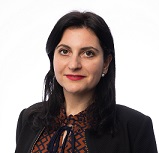We spoke to Katerina Papavasileiou, who is responsible for ESG strategy and implementation for the Federated Hermes Real Estate team, including Real Estate Debt. Prior to Federated Hermes, Katerina was at JLL, leading portfolio-level strategic implementation of ESG considerations, developing asset-level specific action plans for climate change and risk, biodiversity, circular economy and social value.
Tell us about yourself
I am Director, ESG and Responsibility, at Federated Hermes Real Estate which includes leading the net zero agenda across our $8.3 billion real estate portfolio of both existing assets and new developments.

Photo: Private
What first attracted me to working the real estate industry was the exciting opportunity it offers to contribute to tangible change for the society and the environment around us. For me, it is a privilege to be part of such a dynamic sector which is constantly evolving and delivering tangible change for communities and the environments we live and work in.
I started my career in real estate assets with the dual aims of improving people’s lives as well as supporting positive changes for the environment. At first, I worked for a non-governmental organization implementing sustainability awareness programmes before moving to a construction company to gain additional private sector experience, followed by property management, where I guided investors on their ESG implementation strategies.
What are your areas of expertise?
Primarily, my role involves ensuring the team progresses towards – and meets – our ambitious ESG commitments on climate resilience, biodiversity, and social impact, all while delivering sustainable returns for our clients.
I have always been interested in how we can transfer the skills and the expertise of the private sector to large-scale societal transformation towards sustainability. I began my academic career focusing on management science and economics to give me a strong foundation in this area before diving into the world of environmental policy.
What has been the proudest moment of your career?
There is not a single moment that stands out. What I am proud of is the dedication and determination to keep going in those moments where things do not seem to work out. Building resilience in your teams is one of the most important skills to develop, supporting your organization to perform at its peak in terms of ESG delivery and create the confidence within your team to navigate through uncertainty.
What advice would you give a person starting a career in ESG?
For the next generation of ESG leaders, the scale of the challenge ahead can seem overwhelming, and it is easy to be intimidated by the extent of the work that must be done to decarbonize existing real estate portfolios. This said, the pace of change can also appear frustratingly slow to those starting their career with plenty of enthusiasm and energy to drive positive change.
Our sector can be a catalyst to sustainable development if we direct our efforts and expertise to accelerate our journey towards a just transition. With this in mind, at the start of a career in ESG, I’d advocate for consistency over intensity, which will help to compound your efforts and amplify your impact.
What upcoming ESG regulation does the real estate industry need to know about and/or prepare for?
We are expecting stringent legislation on ESG in the short term, especially in the environmental agenda, as extreme weather events will occur more often. The focus will be on actual energy performance of the asset, having net zero transition plans and how we are progressing against targets. Asset owners and managers need to also be prepared for regulations around retrofitting and refurbishing vs demolishing building, with embodied carbon playing a crucial role in the decisions for the future of an asset.
What advice would you give to your younger self?
Invest in yourself, but you should not wait until you feel ready before you start pursuing your dreams. You become ready when you do the job. Also, embrace the uncertainty and not knowing exactly the destination. Joseph Campbell said: “If you can see your path laid out in front of you step by step, you know it’s not your path.” This is especially true of a fast-moving area like ESG, where many career paths and job titles and functions simply didn’t exist 10n or even five years ago.
Tell us an amusing anecdote about your work
It’s always funny to find out the assumptions that many people who are not familiar with the ESG field often make about the nature of my work. Particularly, in the early stages of my career, when sustainability had not become “mainstream”, my friends thought that I was always out protesting, going around offices to switch off the lights and have an ever-ending supply of reusable tote bags (which I now have!).
What are your hobbies and interests?
I love losing myself in all forms of visual arts from art exhibitions to immersive theatre experiences and have a particular interest in artists whose works bring together my love of the natural environment with their art. We can learn so much from the arts about how different people collaborate to make creative ideas a reality.
I also seek out opportunities to push my boundaries and challenge myself. I’ve just returned from an amazing hiking trip in Peru and Bolivia – a trip that stretched both my body’s and mind’s capabilities!
Can you recommend a good book?
I have been reading Sum: Forty tales from the afterlives by David Eagleman. A smart and quite funny book.

















